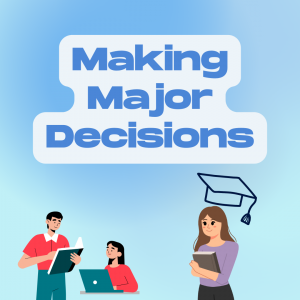 By Qristine Owusu, Health Professions Peer Ambassador
By Qristine Owusu, Health Professions Peer Ambassador
There are a lot of hot topics when it comes to college, but I think a very important topic is exploring majors. Entering college, I was very certain that psychological sciences was the most interesting major area for me. I thought being in this major could help me balance my future pre-dental course load and my fun courses for learning about the brain. Within three months of my freshman year, I was automatically influenced by other opinions around me:
“No, no, no, trust me–you’re going to want to take on a biological sciences major. It would make your life so much easier because that way your pre-dental courses and your major courses coincide with each other. You might even graduate early!”, Peer A said.
“Why are you a psychological sciences major but you want to go into the dental field? That makes zero sense,” my parents asked.
These opinions started to travel all the way from voices within my head to finding myself opening my laptop and making the final decision to become a biological sciences major.
Within minutes of changing my major, my upcoming semesters were full of science classes and maybe one elective each semester that I actually enjoyed even more. As time went on, it became harder for me to juggle all the science courses at once. It started getting confusing on when to switch my brain from chemistry to biology, or from BIOL 1107 to CHEM 1128Q. Soon, I started going to office hours twice every week. The amount of time I put in for the major and to fulfill its requirements was not helping me. Eventually I decided to switch my major to something more balanced, something that I thought I would actually enjoy but still challenge me so that it would sound good to say when telling people what I’m studying in school.
I talked to a couple of friends that were interested in coding in the brain and had various interdisciplinary interests. As a result, I changed my major to cognitive science, which also allowed me to connect more with psychological sciences again. I was very happy going into this major because it felt like a fresh start. I thought I knew a lot about cognitive science because of how it deals with the human brain and how we decode certain events within it. I took all sorts of classes in different academic disciplines and still maintained my pre-dental courses. As you may all know, as you move into new semesters, the courses get more difficult. In my case, the work started to turn into more and more complex neural coding than psychology. At that point, I felt like I was drowning without knowing. I was then just going to lectures just to go, completing homework assignments to the best of my capability, and trying my best to pass my exams, yet it just felt like I had not found my true niche. I told myself that it was not enough and that in order for me to figure out what major I would truly love while balancing my prerequisites, I needed to re-discover the root of what I was currently best at doing.
After the toughest semester ended, I went to the nearest Barnes and Nobles store and skimmed the back of many books for hours trying to figure out what I was fascinated by. I came across one passage titled “Science and Psychology.” It caught my eye faster than any other book in the bookstore. I ended up getting two books that I read during the next month and realized that all along my niche was what I came into this university with–psychological sciences. If I had given it more of a chance in my early college career, I’m sure I would’ve figured out the correct major to stick with in the long run. I am here to say that it is okay to change your major as many times as you want, but when you find your niche, stick to it and expand on it as much as you can. After all, it will benefit you in the long run, whether you’re a science major or not.
Qristine is a senior with a major in psychological sciences. Click here to learn more about and connect with Qristine.